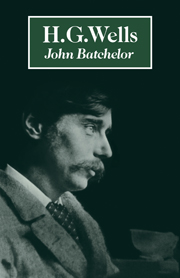Book contents
- Frontmatter
- Contents
- Preface and acknowledgements
- List of abbreviations
- 1 The romances of the 1890s: The Time Machine, The Island of Dr Moreau, The War of the World
- 2 The Edwardian achievement, I: Love and Mr Lewisham, Kipps, The First Men in the Moon, The War in the Air
- 3 The Edwardian achievement, II: Tono-Bungay, Ann Veronica, The History of Mr Polly
- 4 The decade of struggle: Mr Britling Sees it Through, Boon, ‘prig’ novels and discussion novels
- 5 Wells in the modern world: Mr Blettsworthy on Rampole Island, The Bulpington of Blup, The Croquet Player, dualism and education
- Conclusion
- Notes
- Chronology
- Index
5 - Wells in the modern world: Mr Blettsworthy on Rampole Island, The Bulpington of Blup, The Croquet Player, dualism and education
Published online by Cambridge University Press: 18 December 2009
- Frontmatter
- Contents
- Preface and acknowledgements
- List of abbreviations
- 1 The romances of the 1890s: The Time Machine, The Island of Dr Moreau, The War of the World
- 2 The Edwardian achievement, I: Love and Mr Lewisham, Kipps, The First Men in the Moon, The War in the Air
- 3 The Edwardian achievement, II: Tono-Bungay, Ann Veronica, The History of Mr Polly
- 4 The decade of struggle: Mr Britling Sees it Through, Boon, ‘prig’ novels and discussion novels
- 5 Wells in the modern world: Mr Blettsworthy on Rampole Island, The Bulpington of Blup, The Croquet Player, dualism and education
- Conclusion
- Notes
- Chronology
- Index
Summary
A one-man didactic system, 1920–46
Wells had little direct experience of power. His brief involvement with the Fabian movement had ended in a quarrel and separation, and during the last year of the Great War he worked for Lord Northcliffe, Director of Enemy Propaganda, as Chairman of the ‘Committee for Propaganda in Enemy Country’. Wells soon fell out with Northcliffe; characteristically, he wanted to do things his way and to use the committee to tell the world how it should reorganise itself when peace was restored. Further, he detected what he saw as a split between the conciliatory proposals that his committee was drafting in Northcliffe's name and the crude anti-German stance adopted in Northcliffe's newspapers (MacKenzies, pp. 315–17). He resigned, taking from this brief spell of government service a sense of futility, and seems at this point to have turned his back on politics and administration and returned to the earliest of his roles, that of teacher; with the difference that he was now to be a ‘teacher-at-large to the human race’ (MacKenzies, p. 318). Works like Joan and Peter and The Undying Fire demonstrate the prominence of the new preoccupation. The Outline of History (1920) is his first sustained performance in his new role. It was his testament, an ‘alternative to the Bible, retelling the story of mankind in secular terms’ from a Fall to the promise of a new (Wellsian) Jerusalem (ibid., p. 323).
- Type
- Chapter
- Information
- H. G. Wells , pp. 123 - 154Publisher: Cambridge University PressPrint publication year: 1985



